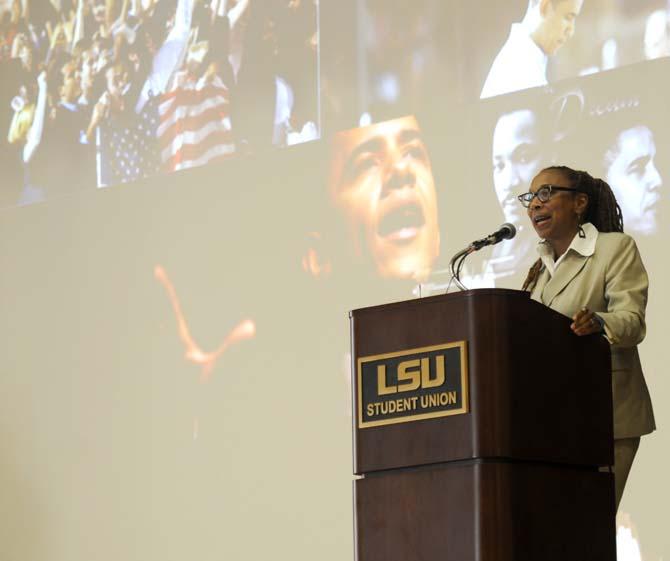With an air of camaraderie, community and collaboration, civil and women rights activist Kimberlé Crenshaw argued in her speech Friday that society may not be in a post-racial state, as many Americans have come to believe.
Crenshaw is the executive director of the African American Policy Forum and professor of law at UCLA and Columbia Law School. She also coedited a volume titled “Critical Race Theory: Key Documents That Shaped the Movement.” “Critical Race Theory” examines the social aspects surrounding race and how these issues affect race, law and power.
Crenshaw presented her ideas concerning the current state of racial tension in the Royal Cotillion Ballroom of the LSU Student Union to University students and faculty as well as some predominant political figures, including former Gov. Edwin Edwards.
Almost the entire speech was presented as a hypothetical dialogue between Larry King’s son in the future and Martin Luther King Jr., imagining Luther King could return in the future somehow to evaluate the U.S. and the progress it has made.
The main point of Crenshaw’s speech was establishing her idea of intersectionality and its effect on the American people. Crenshaw used this term to explain the concept of people being discriminated against for multiple reasons at the same time, such as being both female and African-American.
Crenshaw explained in her speech that ignoring racism as if it does not exist in the U.S. is not a solution to the problem.
“It’s like saying the way to get rid of asbestos-linked diseases is not looking for asbestos in our institutions,” Crenshaw said.
Krystie Nguyen, coordinator of Cross-Cultural Affairs in the Office of Multicultural Affairs, said the difference in Crenshaw’s talk is that she can attest to issues currently occurring in the realm of civil and women’s rights.
Some speakers focus more on the history of the movement and characters that played major roles in that movement, Nguyen said. Crenshaw can speak to the modern-day movement of human rights, she said.
“People are more than what you see on the outside and are self- identifying with more than just what is on the outside.”
Civil and women’s rights activist comes to University
February 23, 2014
Kimberlé Crenshaw, Executive director of the African American Policy Forum and professor of law at UCLA and Columbia Law School, speaks to students Friday, Feb. 21, 2014 about race and “intersectionality”, a concept she coined to capture the multidimensional dynamics of discrimination.
More to Discover



